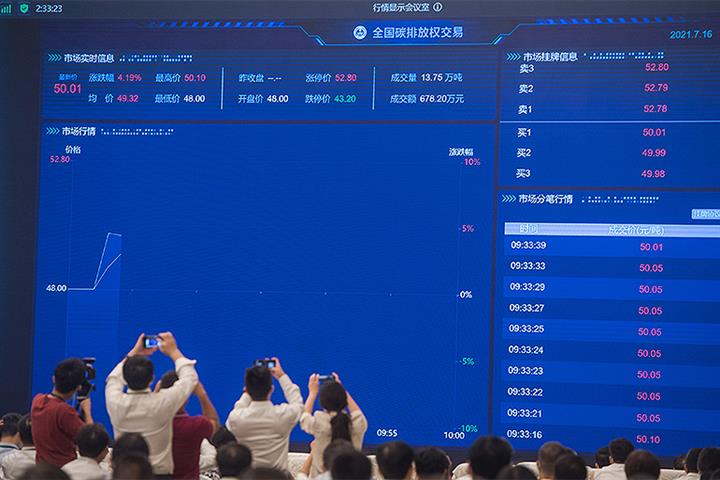 Surging Carbon Prices Cause Higher Transformation Risks to Firms, EDF Experts Say
Surging Carbon Prices Cause Higher Transformation Risks to Firms, EDF Experts Say(Yicai Global) July 19 -- Rising carbon credit prices mean a higher transformation risk for various entities, according to insiders at the New York-headquartered Environmental Defense Fund.
Carbon credit prices are based on supply and demand, Beijing-based representatives of the environmental organization said to Yicai Global on July 17. It has helped Chinese authorities design and test pilot systems for carbon offset trading over the past decade.
China launched its first national carbon credit trading system on July 16. Prices of offsets climbed 6.7 percent on the first trading day.
Experts answered Yicai Global's questions.
Yicai Global: How is carbon priced?
Experts at EDF: A carbon market is similar to traditional commodity and financial markets, where prices are mainly subject to the relationship between supply and demand.
From the perspective of supply, relevant regulations on emissions quota and multi-period storage have a great impact on carbon prices. From the perspective of demand, carbon prices are affected by many factors, including macroeconomy, energy prices, and future investment. In addition, the formation of carbon prices requires certain liquidity and market activity as a guarantee.
Yicai Global: How will China's national carbon trading market launch affect energy-consuming industries?
Experts: At present, the national carbon trading market only covers the power generation industry. But it will include other key industries in the near future, including those with high fossil fuel consumption, such as electricity, steel, petrochemical, building materials, and aviation.
The implementation pressure of the national carbon market will force the above-mentioned industries to formulate a transformation path toward low emissions.
Yicai Global: How will companies change their strategies and investments based on the expected carbon price hikes?
Experts: Rising carbon prices mean a higher transformation risk for various entities.
At the same time, more and more companies have committed to achieving net-zero emission targets while disclosing their relevant paths, and assessing climate risks in different scenarios. In the future, entities will invest more in the research and development of low-carbon technologies, renewable energy, as well as power networks and storage.
Yicai Global: What important related issues need to be urgently solved?
Experts: First of all, carbon market management rules should be promulgated as soon as possible, and data quality assurance should be further strengthened.
Secondly, it is necessary to further improve the carbon quota allocation method, perfect the price stabilization mechanism, introduce an auction mechanism, and widen the scope to more industries.
Moreover, the bourse needs to clarify access criteria for financial institutions and individuals, as well as introduce other market participants in addition to key emission enterprises at an appropriate time. It should also research and develop derivative products.
Yicai Global: How to ensure data accuracy?
Experts: China's national carbon market has established its own monitoring, reporting, and verification system.
The accuracy of data is very important, but it is more important to maintain the consistency of data analysis and collection methods in order to ensure the effective allocation of quotas and avoid excessive quotas due to statistical changes.
Editor: Emmi Laine, Xiao Yi